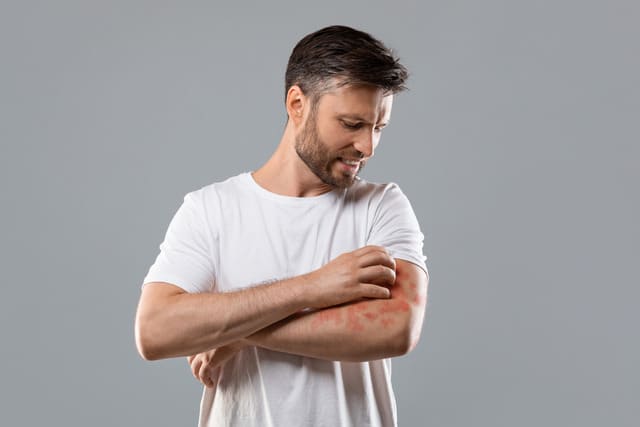5 Most Common Causes of Psoriasis Flare-Ups

One of the most common skin disorders, psoriasis, is an autoimmune response in which skin cells multiply at an accelerated rate. This leads to the formation of scaly, itchy skin patches that can appear anywhere on the body, although they're most commonly found on the scalp, knees, elbows, palms, torso, soles of feet, and lower back.
There's no cure for psoriasis, and its exact causes haven't been determined. However, certain triggers are known to cause "flare-ups" of this painful chronic condition.
While it's impossible to prevent psoriasis, you can reduce your risk of psoriasis flare-ups by familiarizing yourself with these five common triggers.
1. Stress
Stress tops the list of psoriasis triggers. At the same time, psoriasis flare-ups can be stressful in and of themselves. While this can result in a vicious cycle, certain tools—such as stress management and relaxation techniques—can help break the cycle.
2. Skin Injuries
An example of a reaction known as "the Koebner phenomenon," psoriasis flare-ups can occur at the site of a skin injury or irritation. Everything from sunburns and scratches to vaccinations and bug bites can lead to the Koebner phenomenon—and psoriasis flare-ups.
3. Illness
Illnesses like ear infections, respiratory infections, tonsillitis, strep throat, and bronchitis compromise the immune system. Because psoriasis is an autoimmune disease, it follows that these and other illnesses that attack the immune system are also associated with psoriasis flare-ups.
4. Weather
Cold, dry winter weather can strip skin of moisture and trigger psoriasis flare-ups. Moisturizing frequently, using a humidifier, and protecting your skin from exposure to extreme weather can all help reduce your risk of psoriasis flare-ups.
It's important to note that summer weather doesn't mean you're in the clear, either. Both sunburn and heavy air conditioning use can lead to skin irritation that can trigger psoriasis.
5. Alcohol
Alcohol consumption can lead to psoriasis flare-ups. Additionally, keep in mind that some psoriasis medications, such as , are unsafe to take with alcohol. While abstaining completely is the best way to reduce your risk of a recurrence of this skin disease, at least limiting your alcohol intake can also be effective.
Effectively Treat and Manage Psoriasis in Coral Gables, FL
Experiencing painful symptoms of psoriasis? Florida Academic Dermatology Center offers the latest psoriasis treatment options. Call us at (305) 324-2110 to schedule an appointment today.